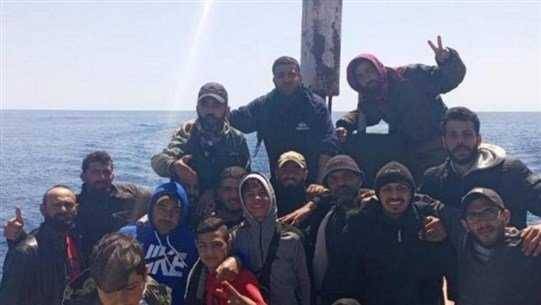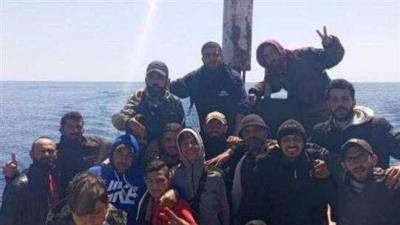The issue of illegal immigration by sea remains a prominent topic in the north, amid conflicting reports about the departure of a new boat from the shore of Miniyeh carrying between 50 and 60 passengers. The regions of Akkar and Tripoli are still grappling with the aftermath of the tragedy that struck them.
**A New Detained Boat?**
Amid conflicting directions to Italy and detention in Turkey, dozens of families went out yesterday to the Al Abdah square in Akkar and staged a protest on the main road demanding that the Lebanese state, the Director General of General Security Major General Abbas Ibrahim, and the Secretary General of the Supreme Relief Committee Major General Muhammad Khair, communicate with Turkish authorities to secure the release of detainees from one of the boats. The families claim this boat departed on the 17th of this month heading to Italy, different from another boat that was detained in Greece and later deported to Turkey. According to the families, Turkish authorities arrested the 100 passengers, who are now in Turkish prisons as reported through their communications. They criticized the indifference of the Lebanese government, its president, and the republic's officials regarding what is happening to their loved ones.
The sunken boat off Tartous has prompted experts in maritime rescue and navigation to share their opinions on the journeys from Lebanon's northern coasts to Italy, considering that the sinking of any boat is inevitable regardless of the wave conditions. A fishing boat of poor quality carrying more than 20 tons of passengers and goods, with an estimated travel distance of about 20 days, resembles a dangerous gamble rather than a trip with uncertain outcomes.
**Migrants and Traders**
The journeys that have departed from the north to Europe have transported many young men, each with their own story. One migrant, (A.M) from Akkar, shared with "Al Nada Al Watan": "We emigrated on an iron boat in April of this year to Italy via the sea from the north aiming for Sweden. When we arrived in Italy, we were placed in camps where movement inside and outside is limited and regulated... I have my wife in one of the European countries and later joined her, but I do not advise anyone to migrate, especially in these wooden boats that are completely unsafe. Europe is no longer like before, and there are no jobs or money as some think, in addition to many laws being enacted in those countries that restrict the movement of immigrants from Arab countries."
(M.N) from Akkar, who migrated to Italy by sea and has no relatives in Europe, shared details about his situation in the refugee camp there and said: "We are here in a refugee camp where they provided us with food, water, and internet while we wait for the fate of our residency and permission to work in Italy, which could take time. However, state officials continuously check on our situation and ask us some questions."
**Palestinians Most Migrant**
Lebanon has been facing an unprecedented economic crisis for three years, which the World Bank classified as the worst globally since the mid-19th century. This crisis has led to the collapse of the local currency's value, a sharp rise in unemployment, and increasing poverty rates. The repercussions of the crisis have affected many groups, including Palestinian and Syrian refugees in Lebanon.
The difficult living conditions for Palestinians in refugee camps in Lebanon are a significant reason for the emigration of many of them. The most recent boat that sank off Tartous reportedly carried 30 Palestinians, with many becoming victims. Abu Mrouan, a sixty-year-old citizen from the Nahr al-Bared camp, told us at the Al-Arida crossing: "We live in the camp, but we are dead. There is no electricity, no water, no communications, no healthcare, no job opportunities, and no services or aid from UNRWA. I am waiting here to find out about my son who left on the boat due to poverty and deprivation here."
Moamen, a 19-year-old Palestinian from the Bared camp, believes that "a Palestinian in Lebanon is dead in any case, and despite all the tragedies, he will not hesitate to migrate on any journey, no matter the outcome. If the Lebanese state does not want us to meet this fate, then either it grants us our rights or opens the borders and migration doors for us to leave this hell."
Data indicates that irregular migration by boat will not stop as long as the economic, living, and social realities in Lebanon remain unchanged. Although there has been a slight pause in recent days due to heightened security measures following the Tartous boat sinking, it will resume strongly once this wave settles and the sea calms down.




